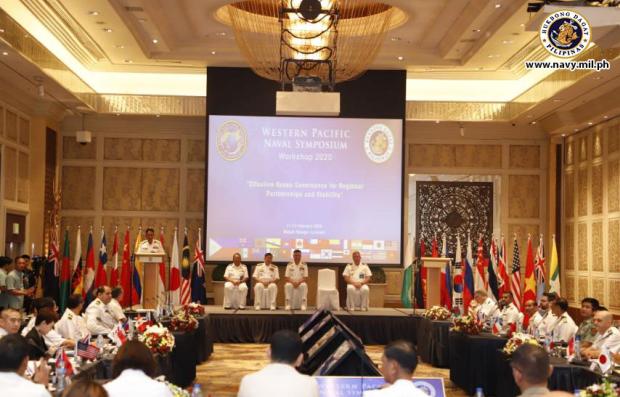
Rear Adm. Giovanni Carlo Bacordo, Philippine Navy chief, led the opening ceremony of the Western Pacific Naval Symposium on Tuesday, Feb. 11, 2020. (Photo from the Philippine Navy)
MANILA, Philippines — The Philippine Navy on Tuesday called on regional navies to work together amid evolving maritime security challenges to ensure peace and stability.
“Western Pacific navies must seek the promotion of a comprehensive approach to maritime security through exploring more functional ways of cooperation while remaining committed to rules-based and sustainable management of the seas,” Navy chief Rear Adm. Giovanni Carlo Bacordo told navy representatives from 23 countries at the opening ceremony of the preliminary workshop conducted at the Makati Shangri-La Hotel on Tuesday ahead of the Western Pacific Naval Symposium (WPNS).
The Navy is hosting the WPNS in May, a series of biennial meetings of navies bordering the Pacific region. The preliminary workshop serves as an avenue to prepare and discuss the issues ahead of the actual symposium.
Countries that participated in the workshop include US, Australia, Japan, South Korea, Singapore, Cambodia, and China.
The theme for the upcoming WPNS is “Effective Ocean Governance for Regional Partnership and Stability.” It aims to increase cooperation and the ability to operate together, as well as to build trust and confidence between navies.
“Peace and stability in maritime domain have taken much greater significance because of wide-ranging strategic issues attached to it, related to sovereignty, resources, safety at sea and freedom of navigation,” Bacordo said.
“The vastness and richness of Western Pacific’s maritime domain is precisely why we face wide array of threats,” he said.
Some countries in the Western Pacific, home to the world’s most vital sea-lanes for global trade, are involved in territorial disputes which cause tensions in the region. Most Asean states, for instance, are located along the coast and depend on its oceans.
Bacordo said there are also non-traditional security threats to deal with like transnational crimes and environmental pollution.
Meetings like WPNS have been crucial in maintaining maritime peace and stability, according to the Navy chief.
It was in the same event that the navies of Pacific nations had established the Code for Unplanned Encounters at SEA (CUES), an agreement adopted in 2014 to de-escalate incidents at sea.
“The CUES considered as a milestone document perpetuates mutual confidence and trust among our navies, thereby facilitating peaceful conduct of maritime activities,” Bacordo said.
He said maritime security challenges in the region are “too varied and daunting to a single nation to effectively address alone,” which calls for cooperation to ensure security and stability.
“It is our task to vigorously strengthen our individual capacities while advancing collaborative endeavors with local, regional and international security partners to enhance interoperability and deepen cooperation,” he said.
/atm